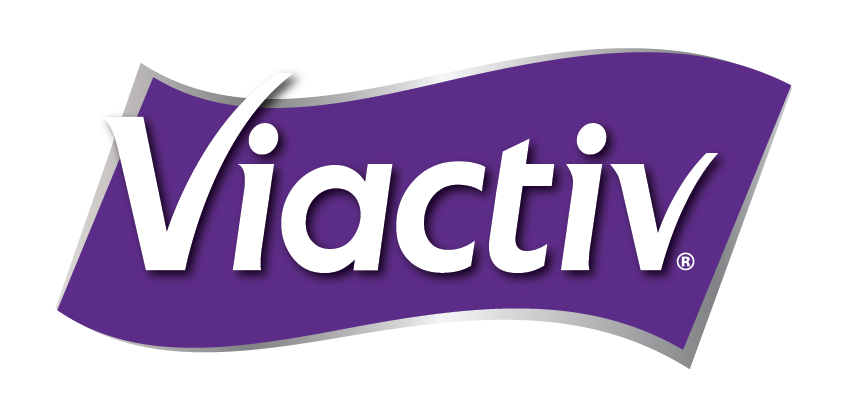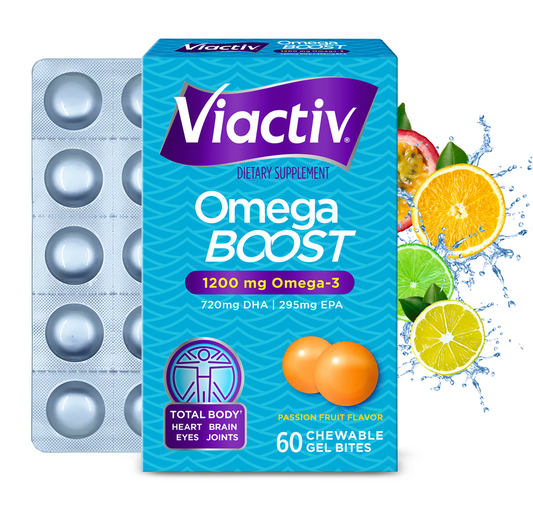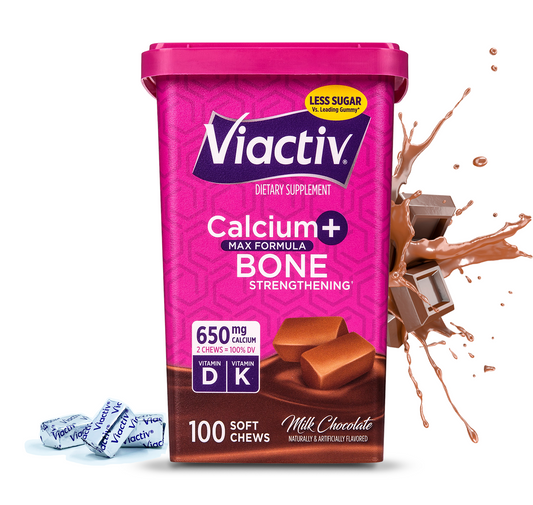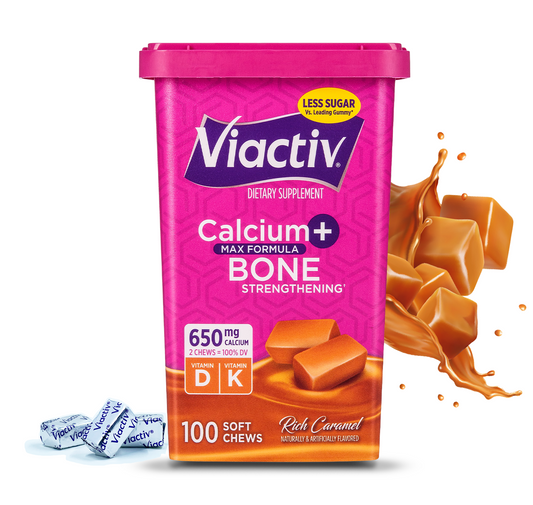

Omega-3: Why You Need It &
Fish Oil Benefits
Learn about the benefits of Docosahexaenoic acid (DHA) and Eicosapentaenoic Acid (EPA) fish oils, and why a daily omega-3 supplement is extremely important for your total body health.

Essential Omega-3s: EPA & DHA
Every cell in the body requires EPA and DHA (Docosahexaenoic Acid and Eicosapentaenoic Acid) to function normally. EPA and DHA are found in every cell membrane of the body. They're essential nutrients, meaning your body can't make or store them; you MUST get them in your diet or through supplementation. Health experts recommend between 500mg – 1500mg of EPA and DHA per day to avoid omega-3 deficiency.

Foods Rich in Omega-3s
Getting nutrients from your daily food choices is always a best first choice. It's recommended to eat 3-5 servings of fresh, wild-caught fish weekly. Some fish with omega-3 fatty acids include mackerel, salmon, anchovies, sardines, oysters, caviar, and herring, in addition to high-quality supplementation.
Types of Omega-3s
The National Institute of Health reports that 78% of Americans don’t get enough marine-sourced omega-3s in their diets. This is because marine-sourced omega-3s (EPA and DHA) are better than the plant source omega-3, alpha-linolenic acid (ALA).
-

Marine-Sourced Omega-3s
Two major forms of omega-3s from marine sources are EPA and DHA. EPA and DHA can easily be absorbed and bioavailable which means they are immediately beneficial by the body when consumed.
-

Plant-Sourced Omega-3s
ALA is the most abundant omega-3 found in nature. To achieve the same benefits, ALA must be biochemically converted into EPA and DHA in the body, but only small amounts of ALA actually converts into EPA and DHA.
Omega-3 Fish Oil Supplement Forms
Many vegans and vegetarians choose to take an omega-3 supplement high in EPA and DHA for this reason. Supplemental omega-3s typically come in two forms:
-

EthylEster Form (EE)
When a fish is caught and the oil is pressed out, the omega-3s start in a natural triglyceride form. Then, this natural oil goes through a purification process by adding ethanol (ethyl alcohol) and removing any toxins/contaminants from the ocean (mercury, PCBs, dioxins, etc). This fish oil is now in the EE form, ethanol still included.
-

Cleaned Triglyceride Form (rTG)
Quality products continue the purification process by removing the ethanol, which leaves the oil in a cleaned, rTG form, mimicking the nutrients our bodies receive naturally from our diet, minus any contaminants from the ocean. The rTG form is approximately 3X more absorbable and, therefore, more beneficial than the EE form.
Fish Oil Benefits
Heart Health
Omega-3s and heart health have been studied since the 1970s. EPA and DHA help maintain healthy triglycerides, maintain blood pressure, support the health of arteries, and assist in maintaining a healthy functioning heart. The American Heart Association (AHA) recommends consuming 500 - 1500mg of EPA and DHA daily.
Brain Health
Consisting of 60% fat, both DHA and EPA are critical for the brain to develop and function properly. Research shows that omega-3 fatty acids are some of the most critical and influential molecules on your brain’s integrity. DHA is the most abundant fatty acid in the brain. Adequate levels of omega-3s supports proper blood flow in the brain, and in turn, may support memory.
Pregnancy Health
Supplements heavy in EPA and DHA fish oil for pregnancy health benefit both the mother and baby. They may also benefit your child during infancy and childhood with proven problem-solving skills and overall well-being.
Children's Health
A study collected data from over 11,000 pregnant women during and after their pregnancies. The study compared developmental, behavioral, and cognitive outcomes of their children from ages 6-months to 8-years. The results showed that the children of the women who consumed less than 340mg of EPA and DHA per week were at the lowest achievement segment for verbal IQ, fine motor skills, and speed of information processing.
Immune Health
Research shows that EPA and DHA boost the immune system by supporting the functioning of immune cells, like white blood cells (also known as B cells). EPA and DHA are also important components of our cell membranes' and can influence and regulate the membrane's ability to receive nutrients and remove waste.
Eye Health
EPA and DHA are essential for maintaining healthy eyes as we age. Photoreceptors, the neuronal cells that make vision possible, have more DHA than any other cells in our body. EPA and DHA may also improve the function of ocular glands responsible for producing the oily layer in tears. This oily layer prevents the water layer from evaporating, keeping our eyes hydrated.
Skin Health
Omega-3s can help with skin hydration by improving skin barrier function to seal in moisture that keeps out irritants. They can also help support the mechanisms that protect against photoaging.
Omega-3 Blog Posts
FAQS
What is fish oil?
Fish oil omega-3 supplements are made by the oils in a piece of fish being pressed out. Once extracted, these oils are placed in a large vat for a specific cleaning called distillation. During the distillation process, ethyl alcohol (ethanol) is added to raise the boiling point and allow the impurities in the oil to precipitate off. Once the impurities are removed, the fish oil is then analyzed so that the EPA and DHA molecules can be isolated and concentrated.
How does omega-3 work?
The American Heart Association, and most healthcare professionals, recommend between 500mg - 1,500mg of EPA and DHA per day. EPA and DHA are essential nutrients, meaning we need them to function properly, but our bodies can’t make them from scratch or store them in our body, so we must get them consistently through our diets or through marine sourced supplements.
What are omega-3 fish oil benefits?
Some omega-3 fish oil benefits include heart, brain/cognitive, immune, hair, skin, nail, eye, joint, and pregnancy health, just to name a few.
What is EPA and DHA?
The most common Omega-3s are called Alpha Linolenic Acid (ALA), Eicosapentaenoic Acid (EPA) and Docosahexaenoic Acid (DHA). EPA and DHA are known as “preformed” omega-3s, which means that the nutrients can be immediately beneficial when consumed. In very simple terms, plant source omega-3s are tasty, but not beneficial to replenish omega-3’s EPA and DHA, which are the ONLY omega-3s that are useful in the body. EPA and DHA help organs, the immune system, and hormone systems function at their best.
How much omega 3 fatty acids per day?
The American Heart Association, and most healthcare professionals, recommend between 500mg - 1,500mg of EPA and DHA per day. So, the American Heart Association (AHA) recommends that all adults eat two oily fish meals twice a week (4 meals total). Most evidence suggests that eating omega-3 rich foods or taking a high-quality omega-3 supplement with a healthy meal can increase its absorption, but there is no correct or incorrect way to take it.
Do omega 3s help maintain blood pressure?
A diet rich in fish and seafood has been associated with sustaining healthy heart functions such as maintaining good cholesterol levels, supporting a healthy resting blood pressure, and even providing antioxidant properties that may improve the function of the cells that line blood vessels, in turn supporting circulation.
What are the omega 3 benefits for women?
Omega-3 fatty acids, EPA and DHA, found in fish oil help maintain healthy triglycerides, maintain blood pressure, support the health of arteries, and assist in maintaining a healthy functioning heart. The American Heart Association (AHA) recommends consuming 500 - 1500mg of EPA and DHA daily. In addition, research has shown that fatty acids in omega-3s help sharpen memory by helping nerve cells in the brain communicate effectively with each other.
What are the omega 3 benefits for men?
Omega-3 fatty acids, EPA and DHA, found in fish oil help maintain healthy triglycerides, maintain blood pressure, support the health of arteries, and assist in maintaining a healthy functioning heart. In addition, research has shown that DHA fatty acids in omega-3s help sharpen memory by helping nerve cells in the brain communicate effectively with each other.










